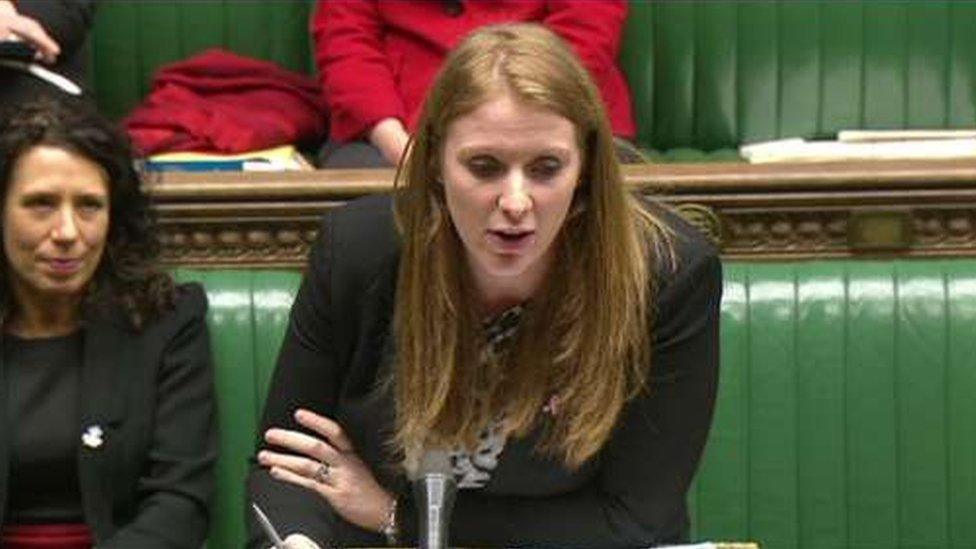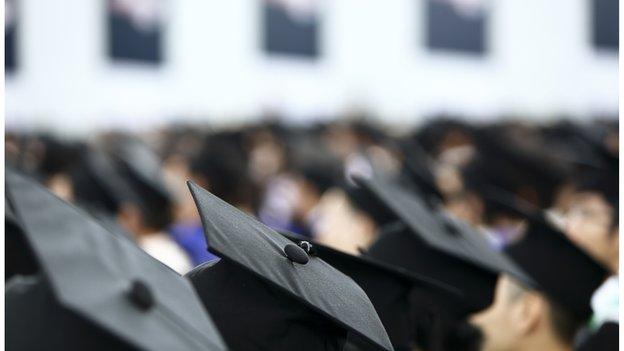Labour promises return of student maintenance grants
- Published

Labour is calling for the return of grants for 1.25 million poorer students
Labour says it would restore grants to help young people in England stay in further and higher education.
This would mean a return for education maintenance allowances (EMA) scrapped by the coalition government in 2010.
It would also mean reversing the decision to turn maintenance grants for poorer university students into repayable loans.
Shadow education secretary Angela Rayner said it showed a commitment to "investing in our young people".
But a Conservative spokesman said that the current student finance system had seen record numbers in post-16 education and training.
Labour says it would pay for the support for 1.25 million poorer students by increasing corporation tax by up to 1.5%.
It is proposing that the EMAs, a flagship policy of the previous Labour government, should be reinstated.
They were means-tested payments of between £10 and £30 per week intended to encourage 16- to 18-year-olds to stay in sixth forms and further education colleges.
The policy had been scrapped by the coalition government, which described it as a poorly targeted use of education funding - but Labour says research has shown that it had been cost-effective.
Labour also wants to overturn the decision by the current government to end maintenance grants for students from poorer families and replace them with loans.
The former Chancellor George Osborne, announcing the scrapping of maintenance grants, said that the current cost of £1.57bn per year would have doubled to £3bn in the next decade.
Mr Osborne said there was a "basic unfairness in asking taxpayers to fund grants for people who are likely to earn a lot more than them".

Angela Rayner and Jeremy Corbyn say everyone benefits when people go to university.
But Ms Rayner said: "It is only by investing in education that we can ensure that all of our young people, whatever their background, are able to succeed in whatever they aspire to.
"When we can help improve the education of over a million young people with a small increase in corporation tax, it is an investment we would be foolish not to make."
In an article co-written with Labour leader Jeremy Corbyn, Ms Rayner says that investing in education is vital to improving productivity and competing in technology-based industries.
Mr Corbyn and Ms Rayner say that it is "disgraceful that the Conservative government abolished student grants that levelled the playing field for young people from low and middle income backgrounds".
"Opportunity taken from them is a loss to us all, leaving Britain worse off," they say.
"As two politicians who never went to university, we have nevertheless benefited from those that did - we do so every time we visit our GP or dentist, when our children go to school or when we buy the latest gadget.
"Education is a collective good that benefits all of us."
But a Conservative party spokesman said: "Without a proper explanation of how all Labour's education proposals could be funded in full, they amount to little more than warm words.
"Yet again Labour are proving themselves too incompetent and chaotic to build a country that works for everyone.
"We have reformed the financial support for 16-18 year olds who are most in need, in contrast to the costly and poorly-targeted Education Maintenance Allowance.
"This approach has helped tackle the real barriers to participation, with record numbers in education or training post-16.
"Our planned changes to maintenance for those in higher education will also increase support for the poorest students while making sure student funding remains sustainable."
The National Union of Teachers said: "Family financial circumstances should not dictate access to education. The abolition of the EMA meant that many young people had to give up their education or were pushed into choices they did not want to make."
- Published8 July 2015
